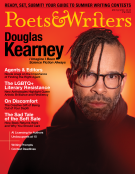At the heart of Steven Espada Dawson’s debut collection, Late to the Search Party (Scribner, May 2025), is elegy. A taut sequence of forty-five spare, intimate poems, the book follows a speaker contending with the loss of his brother and mother. “I’m busy reckoning // how to make a family / from just one man,” writes Dawson. For the past decade Dawson has worked on the collection, which originated as his graduate school thesis at Purdue University, titled “in the dream things are as they should be,” then shifted into another draft called “Elegy, Pending,” before reaching its final form. With precise images and metaphors, Dawson traces how addiction and cancer can ripple through a family and describes living with the absence of loved ones. “Your death the wind,” says the speaker. “I cannot point to it. / I can point to everything it moves.”

Steven Espada Dawson, author of Late to the Search Party. (Credit: Taylor Kirby)
Before he submitted to journals, Dawson patiently polished a “huge pile of work” and then sent poems to literary magazines where he could be “shoulder to shoulder with the folks that helped build up my love of poetry.” One such journal is Waxwing, which has published the work of poets Victoria Chang, Ross Gay, Fady Joudah, Diane Seuss, and Vanessa Angélica Villarreal, among others, whose words Dawson says he stands “in the shadow and shade of.” The online triannual features poetry, fiction, creative nonfiction, interviews, and translated literature, with a mission to showcase “American writers from all cultural identities…alongside international voices.” Every month the editors accept up to three hundred submissions via Submittable; the genre rotates every month or two.
A series of elegies to the heart of the speaker, as well as those of his mother and brother, threads throughout Late to the Search Party. One of these poems appeared in Waxwing, and another in Booth, which Dawson recalls discovering as an undergraduate at a writers conference. “[I was in] total nerdy awe of their incredible covers and book design,” he says. Booth, which is produced by the MFA program at Butler University in Indianapolis, showcases poetry, fiction, creative nonfiction, interviews, and comics in two print issues a year as well as online. Submissions in all genres open via Submittable in September, with the Booth team noting they are eager to see more nonfiction, lists, audio files, and comics. All contributors receive $50.
The editors at Split Lip Magazine passed on Dawson’s work six times before accepting “A River Is a Body Running,” a sonnet about an overdose that opens his collection. Dawson was proud to publish with the online magazine, which bills itself as “totally bonkers-in-love with voice-driven writing, pop culture, and the kind of honesty that gets you right in the kidneys.” Every month the editors publish one piece of poetry, flash fiction, fiction, and memoir, a format Dawson appreciates. “From an editing perspective you have to really believe in a poem to highlight it for an entire month, taking only twelve a year.” Submissions in all genres, including interviews, reviews, and art, are open year-round via Submittable except during July and the second half of December. All contributors are paid between $25 and $75 for a piece.
Dawson’s persistence in submitting his work also paid off with his poem “Elegy for Brian, My Brother Who Has Been Missing for Ten Years,” which was rejected seventeen times before the Kenyon Review accepted it. The print quarterly of poetry, fiction, and nonfiction is edited at Kenyon College in Gambier, Ohio. Since releasing its inaugural issue in 1939, the review has grown into an incubator for writers, not just publishing work online and in print, but also hosting workshops for adult and young writers and administering fellowships to promising authors. The magazine frequently features themed folios; in 2025 the editors will publish folios focused on translation, architecture, the lyric essay, cinema, and visitation. All contributors are paid eight cents per published word of prose or sixteen cents per published word of poetry. Submissions will open via Submittable for the month of September.
In the past couple of years, Dawson has spent less time sending out work and more energy teaching and mentoring students at universities, libraries, and prisons; he is also the current poet laureate of Madison, Wisconsin. He often leans into solicitations to “jostle me back into a half-finished draft,” he says. For instance, Dawson drafted and polished a poem for publication in the Rumpus, after then–poetry editor Cortney Lamar Charleston reached out. “In truth I had nothing remotely ready—just incoherent images and ideas scattered across different .docx files,” says Dawson. “But when CLC asks you for something, how can you say no?” Dawson’s poem appeared in the online magazine’s annual National Poetry Month feature in which a different poet is spotlighted every day. Submissions open in June for essays and in August for poetry, fiction, and comics; pitches for book reviews and interviews are open year-round. The Rumpus is currently fund-raising to continue paying writers $50 per original piece.
Dana Isokawa is the editor in chief of the Margins and a contributing editor of Poets & Writers Magazine.








